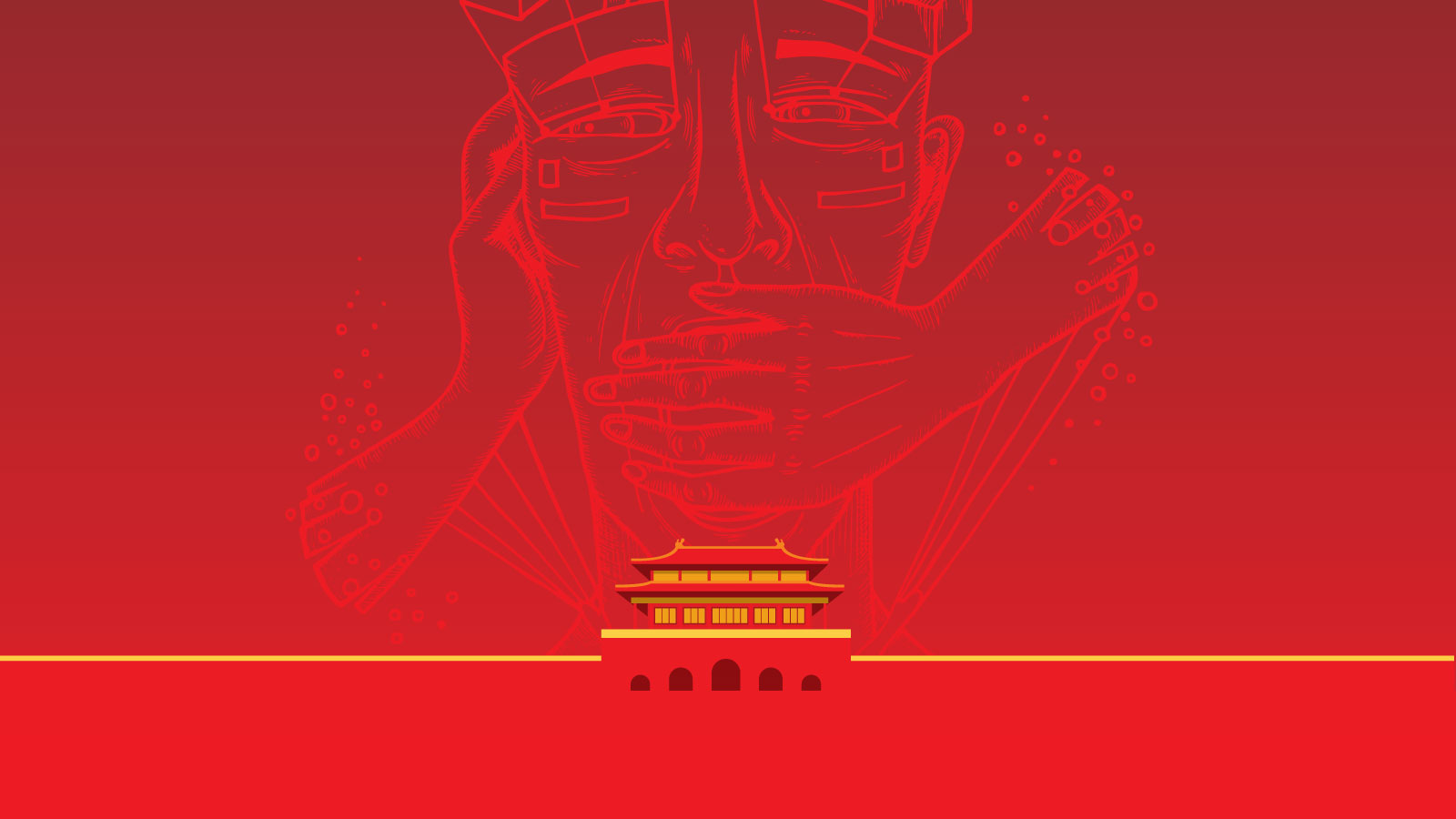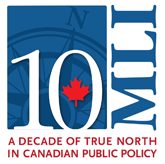When articles appear in western media that include claims and arguments that align or reverberate with narratives promoted and amplified by malign foreign regimes, they deserve analysis.
In this DisinfoWatch entry we analyse a recent Globe and Mail opinion piece titled “Anti-China sentiment is becoming anti-Chinese prejudices in Canada,” written by Senator Yuen Pau Woo, who was appointed by Prime Minister Trudeau in 2016, and Paul Evans, HSBC Chair of Asian Research at the University of British Columbia. The opinion piece conflates criticism of the Chinese regime’s policies with anti-Chinese racism.
The piece published by the Globe and Mail features several arguments that align with Chinese government narratives and that share tactical similarities with those used by other repressive authoritarian regimes.
This isn’t to say anti-Asian hate is not a real problem. It is a reality many are grappling with here in Canada. And it doesn’t solely affect those of Chinese descent either. Many other Asian communities have been targeted by anti-Asian hate. Discourse, in some cases, has been oversimplified and caused harm. Certain clumsy narratives around COVID-19 and racist stereotypes have fanned the flames of anti-Asian hate. However, the authors fail to acknowledge that many critics of the CCP have also spoken out against anti-Asian hate. Nor should it absolve the CCP of any and all criticism, especially when actions taken by China actively harm Canadian citizens.
Accusing the critics of authoritarian and totalitarian regimes of racism was pioneered during the Soviet era and is a tactic that has been deployed with prolific zeal by the government of Vladimir Putin. The accusation of prejudice against Russians – or “Russophobia” – is leveled at those who criticize the Kremlin’s repression of human rights activists, its aggression in Georgia and Ukraine and in cyber space, and its interference in western democracies. The goal of this tactic is to discredit dissidents and critics, and to deflect attention away from Russian government abuses.
Canada’s diverse and racially tolerant society is particularly sensitive to such accusations. Repressive authoritarian regimes like those in Beijing and Moscow aim to leverage this sensitivity to advance their causes.
The authors state that “public discussion is becoming toxic” but they neglect to mention Beijing’s deliberate role in fomenting such discord through its use of disinformation, belligerent “Wolf Warrior” diplomacy, hostage diplomacy, economic coercion, and other aggressive actions. The propaganda is intended to deflect from Chinese government’s domestic policies and actions, such as its ongoing and well documented genocide in Xinjiang and the role of Chinese tech companies in facilitating an unprecedented, high-tech surveillance state – one that is now being exported to other authoritarian regimes to snuff out democracy.
The authors make no mention of the Chinese government’s well documented transnational repression against its own people and human rights activists living in Canada. Canada’s National Security and Intelligence Committee of Parliamentarians has clearly outlined the threat of Chinese government influence and intimidation operations in Canada. Activists have received threats of violence, murder and even rape.
It is also telling that the authors, while raising “the detention in China of Canadians Michael Kovrig and Michael Spavor,” fail to add that both men have been wrongly and arbitrarily detained, as an act of state retaliation based on totally fabricated charges. Simply put, both men are being held hostage by the Chinese government, in retaliation to the completely lawful arrest and trial of Meng Wanzhou. By failing to provide the necessary context to the situation facing both Meng and the Two Michaels, the authors obfuscate an important distinction that serves the interests of the Chinese government and bears similarities to regime narratives about them. It also coincides with the authors’ apparent unwillingness to place any blame on China’s actions for this “toxic” public discussion. It can even be seen in how they seem to blame FBI and US Department of Justice prosecutions of academics on the grounds of espionage for the “toxic atmosphere,” as opposed to the actions of the people who committed the espionage in the first place.
A reference is made by the authors to 1950s McCarthyism – insinuating that critics of the Chinese Communist Party are engaging in a type of unwarranted “witch hunt.” This is a tactic frequently employed by authoritarian regimes who seek to discredit critics of their policies by accusing them of irrationality. The Kremlin started using the label in earnest when Russian interference in the US 2016 presidential election became a concern. In an October 2016 opinion piece, Russian state propaganda platform RT published a headline about Hillary Clinton and her legitimate concerns about Kremlin interference: “Clinton using anti-Russia red-baiting not seen since days of McCarthyism.”
'#Clinton using anti-#Russia red-baiting not seen since days of #McCarthyism' – political analysthttps://t.co/ty8JfzoAvh pic.twitter.com/vg7BemcS1H
— RT (@RT_com) October 23, 2016
PRC propaganda outlets have frequently accused critics of “McCarthyism” over the past years, including those in the United States, Australia and Canada.
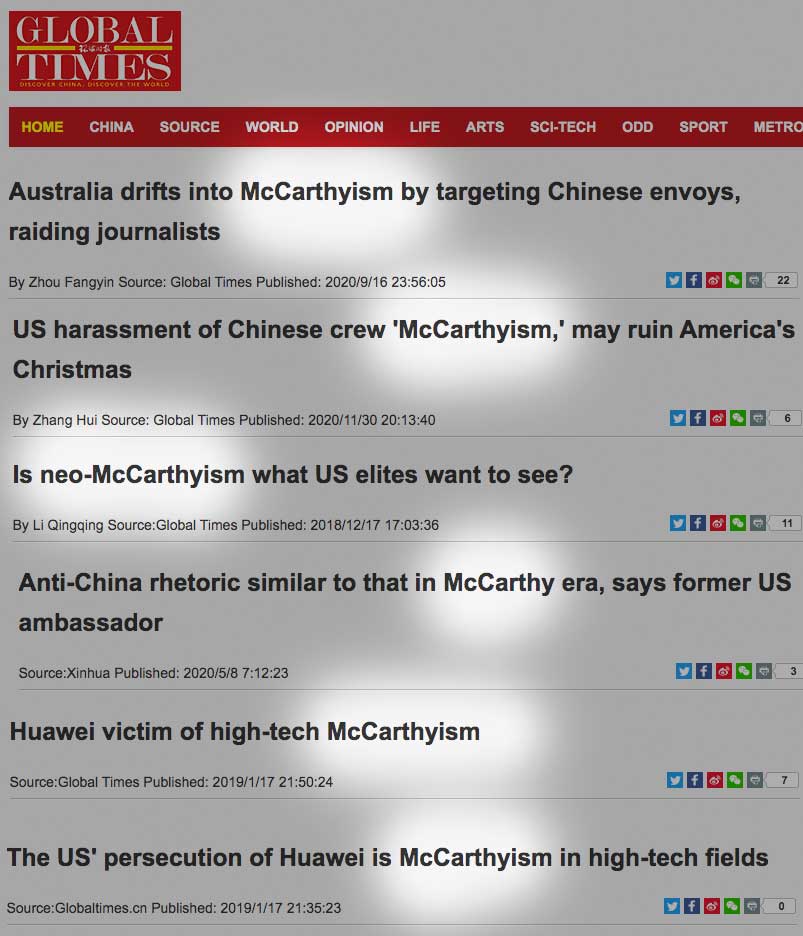
The opinion piece claims that “exaggerated portrayals in the media of the reach and influence of Chinese organizations such as the United Front, Confucius Institutes and the Thousand Talents programs have contributed to racial profiling and stigmatization of people of Chinese descent,” but the authors offer no evidence to support such a claim. However, Canada’s National Security and Intelligence Committee of Parliamentarians 2019 report, which is based on actual Canadian intelligence, repeatedly warns that these groups pose a significant threat to Canadian democracy and society. Additionally, activists and dissidents have voiced their concerns about United Front operations and Confucius Institutes for their potential role in surveillance and intimidation in efforts to silence critics in Canada.
The authors correctly admit that “It is not racist to be critical of China or to take issue with advocates of continued engagement with China,” but they add that “criticism crosses a threshold when it sensationalizes Chinese action.” Yet they fail to mention how many of the criticisms that have been levelled by reputable sources, from Western intelligence agencies to academics and scholars studying these issues, can actually be construed as anything but fair and objective. Indeed, our analysis demonstrates that the accusation of “sensationalism” is regularly levelled against activists, governments and media that are critical of the Chinese government.
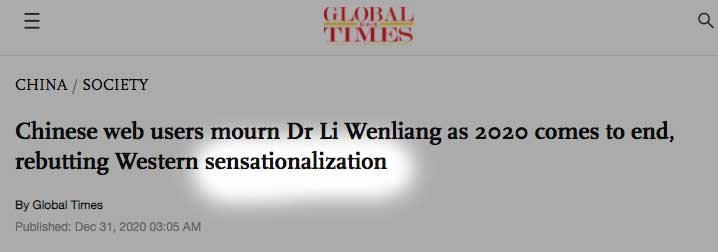 A Google search for the term “sensationalize” on the Chinese government platform Global Times brings up over 20 pages of results where western governments, media, elected officials and critics are directly accused of “sensationalizing” issues related to China. According to Global Times, any criticism of the Chinese government’s policies should be construed as “sensationalism” by Chinese state media – and therefore “racist,” according to the authors of the Globe and Mail piece. It should be noted that Russian state media frequently blames Western media of “sensationalism” in its reporting.
A Google search for the term “sensationalize” on the Chinese government platform Global Times brings up over 20 pages of results where western governments, media, elected officials and critics are directly accused of “sensationalizing” issues related to China. According to Global Times, any criticism of the Chinese government’s policies should be construed as “sensationalism” by Chinese state media – and therefore “racist,” according to the authors of the Globe and Mail piece. It should be noted that Russian state media frequently blames Western media of “sensationalism” in its reporting.
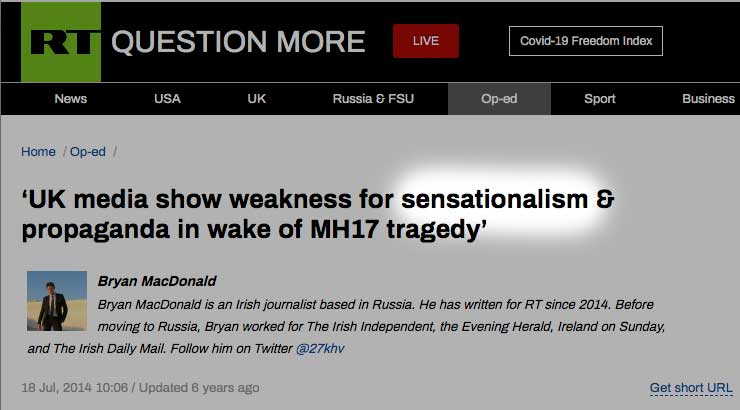
The piece ends with the statement, “simply saying that we are not racist – that we separate the Chinese people from the Chinese state and the Communist Party – is not enough.” What Evans and Woo seemingly fail to appreciate or acknowledge is that the very same Chinese diaspora community targeted by anti-Asian hate is not a monolithic group. Many of the Chinese government’s actions, of which Evans and Woo have tried to characterize criticism of as being “sensational,” have the most profound impact on the Chinese diaspora and dissidents. It is these very actions that have created a climate of fear in which self-censorship is prevalent in order to ensure safety of oneself and loved ones.
Many of Chinese descent are actively resisting CCP foreign interference and influence efforts, and are facing serious and stark consequences for doing so. As mentioned above, dissidents face online harassment, death and sexual violence threats, doxxing and even physical assaults. Evans and Woo, though ostensibly concerned about racism, have neglected to mention these real challenges facing the Chinese diaspora and dissidents.
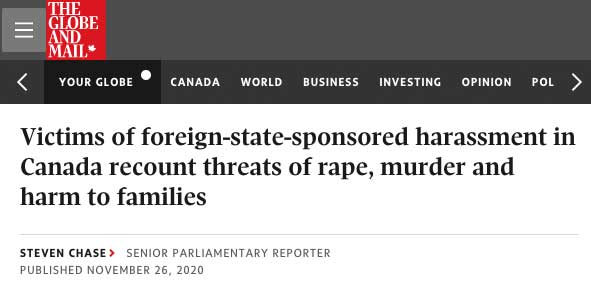
Elected officials must take care to not inadvertently legitimize foreign disinformation narratives by repeating them. Canadian Senators, appointed by Canada’s Prime Minister, should also be held accountable when repeating such narratives and using tactics employed by malign anti-democratic regimes – inadvertently or not. When elected and appointed officials repeat these narratives, they legitimize them and the state media propagandists and media that promote them. In so doing, they themselves become active – if naive or unwitting – participants in their transnational repression of foreign critics.
We recommend foreign disinformation and interference training for all Canadian elected and appointed officials and their staff, to identify such malign foreign tactics so that they are armed with the awareness to avoid engaging in them in the future. It is also imperative that this training happens at all levels of government. The chilling nature of accusations of “racism” in the context of legitimate criticism of totalitarian and autocratic regimes is a serious threat to civil discourse in all liberal western democracies.
